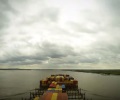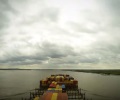

The government of Argentina declared a 180-day “water emergency” for the Parana river, which is seeing historically low levels amid scarce rainfall, early on July 26, in a move that may further imperil grain exports, market sources said.
The country’s key hub of Rosario, located along the river, ships around 80% of the country’s agricultural goods, including soybeans, soy oil, wheat, and corn. As a result of the river turning shallow, exports have been delayed as vessels cut cargoes to avoid grounding.
The emergency comes at the peak time for soybean and corn exports, the two main cash crops of Argentina.
The country is the world’s third largest corn exporter and the top supplier of soy meal and oil.
“The rainfall deficit in the Brazilian basins of the Parana River, the Paraguay River and the Iguazu River is one of the determining factors for the current historical downspout, considered the most important in our country in the last 77 years,” according to the government’s official bulletin.
During the emergency, the national government and ministries will implement measures to alleviate the situation, including urging residents and businesses to reduce water consumption.
“The extraordinary magnitude of the emergency requires that all areas of the national government join forces to mitigate this hydrological phenomenon in the areas affected,” the bulletin said.
The governmental decree impacts provinces of Formosa, Chaco, Corrientes, Santa Fe, Entre Ríos, Misiones, and Buenos Aires.
Source: Platts